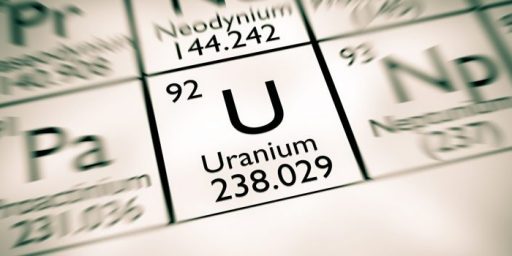Nuclear Terrorism
Sam Nunn and Michele Flournoy have a WaPo op-ed entitled, “A Test Of Leadership On Sea Island,” argue that the problem WMD proliferation, especially the “loose nukes” of the former Soviet Union, seems to be getting short shrift, with potentially disastrous consequences.
Unfortunately, the risk that terrorists could acquire and use nuclear, chemical or biological weapons is all too real. Over time, and without our decisive intervention, al Qaeda could become the world’s 10th nuclear power. The terrorist organization has made several attempts to acquire uranium that could be used to make a crude nuclear device, and documents discovered at an al Qaeda safe house in 2001 showed an understanding of nuclear weapons design. The hardest part for the terrorists is getting the plutonium or highly enriched uranium necessary to build a bomb. Making that impossible should be our goal.
***
The problem is not confined to unsecured nuclear materials. Millions of portable artillery shells and hundreds of missile warheads filled with deadly nerve agents await destruction at dilapidated facilities in Russia. Construction of a U.S.-funded destruction plant was delayed for three years by political and compliance disputes, and current destruction plans will take more than a decade to implement. In the meantime, one stolen shell could be used to kill tens of thousands of people in Washington, New York, London, Paris, Tokyo or Moscow.
In addition, Russian military and civilian research facilities still have deadly pathogen collections; we don’t know exactly what kind they are, how many there are or how secure they are. Thousands of former weapons scientists and workers in Russia remain underpaid or unemployed, making them more vulnerable targets for recruitment by terrorist organizations.
They then list ten perfectly reasonable steps that would go a long way to reining in the problem. Nunn has been on this case for nearly fifteen years. It’s truly amazing that this, relatively easy and specific, problem has been allowed to fester this long.



